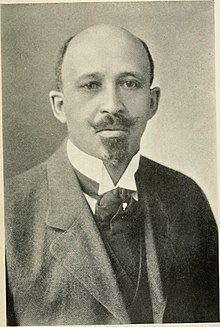
Social and political
20th-century American philosopher and sociologist W. E. B. Du Bois wrote extensively on the black experience in his homeland and abroad; he spent the last two years of his life in the newly independent Ghana and got citizenship there.
Many scholars have challenged conventional views of the African diaspora as a mere dispersion of black people. For them, it is a movement of liberation that opposes the implications of racialization. Their position assumes that Africans and their descendants abroad struggle to reclaim power over their lives through voluntary migration, cultural production and political conceptions and practices. It also implies the presence of cultures of resistance with similar objectives throughout the global diaspora. Thinkers like W. E. B. Dubois and more recently Robin Kelley, for example, have argued that black politics of survival reveal more about the meaning of the African diaspora than labels of ethnicity and race, and degrees of skin hue. From this view, the daily struggle against what they call the “world-historical processes” of racial colonization, capitalism, and Western domination defines blacks’ links to Africa.
African diaspora and modernity
In the last decades, studies on the African diaspora have shown an interest in the roles that blacks played in bringing about modernity. This trend also opposes the traditional eurocentric perspective that has dominated history books showing Africans and its diasporans as primitive victims of slavery, and without historical agency. According to historian Patrick Manning, blacks toiled at the center of forces that created the modern world. Paul Gilroy describes the suppression of blackness due to imagined and created ideals of nations as “cultural insiderism.”
Cultural insiderism is used by nations to separate deserving and undeserving groups[44] and requires a “sense of ethnic difference” as mentioned in his book The Black Atlantic. Recognizing their contributions offers a comprehensive appreciation of global history.[45]
Richard Iton’s view of diaspora
The late cultural and political theorist Richard Iton suggested that diaspora be understood as a “culture of dislocation.” For Iton, the traditional approach to the African diaspora focuses on the ruptures associated with the Atlantic slave trade and Middle Passage, notions of dispersal, and “the cycle of retaining, redeeming, refusing, and retrieving ‘Africa.'”This conventional framework for analyzing the diaspora is dangerous, according to Iton, because it presumes that diaspora exists outside of Africa, thus simultaneously disowning and desiring Africa.
Further, Iton suggests a new starting principle for the use of diaspora: “the impossibility of settlement that correlates throughout the modern period with the cluster of disturbances that trouble not only the physically dispersed but those moved without traveling. Iton adds that this impossibility of settlement—this “modern matrix of strange spaces—outside the state but within the empire,”—renders notions of black citizenship fanciful, and in fact, “undesirable.” Iton argues that we citizenship, a state of statelessness thereby deconstructing colonial sites and narratives in an effort to “de-link geography and power,” putting “all space into play” (emphasis added. For Iton, diaspora’s potential is represented by a “rediscursive albeit agonistic field of play that might denaturalize the hegemonic representations of modernity as unencumbered and self-generating and bring into clear view its repressed, colonial subscript”.
Diaspora citizenship
In the eighth chapter of her book Rihanna Barbados World-Gurl in Global Popular Culture Heather Russell describes diasporic citizenship as an identity where you “simultaneously negotiate the entailments of civic responsibility, public discourse, nostalgia, nationhood, belonging and migration, transnational cultural affiliations and shifting/fluid subject positionalities across material and symbolic boundaries”[47] Musical artists are prime figures to be appraised with this theory due to their acclaim bringing them public discourse and their music bringing cultural affiliations. As such, for musicians who reach this level of transnational stardom and music production, they have to balance their relationship to their identity and their home with the transnational populations they engage with through their music, performance and public image.
Robyn Rihanna Fenty is a global superstar whose music transcends national borders and as such is a perfect case for the diaspora citizen framework. She is one of the few black women to achieve this level of global success and gain diasporic citizenship that forces her to balance her identities with her relationship to her diverse viewership.[47] While Rihanna is by no means the first artist, or even the first black female artist to reach this level of stardom, unlike her peers her diasporic citizenship is characterized by her Caribbean identity. In her book, Russel further describes Rihanna’s diasporic citizenship by saying:
“Rihanna must navigate inevitably conflicting, contesting and reinforcing sites of national and transnational belongings. In other words, she is a Barbadian citizen shining in a US-global sphere within which most citizens can hardly find Barbados on the map. She is a hugely commercially successful artist operating in a popular-cultural market dictated by US global musical tastes.
At the same time, Rihanna is Barbados’s honorary ambassador of youth and culture and has signed a multi-year deal to promote Barbados for the Barbados Tourism Authority. Moreover, local discussions surrounding Barbadian national pride, Victorian notions of female propriety and Christian ideas about decency which Rihanna’s emergence and ascendancy have provoked, continue to capture the Barbadian public’s imaginations and dominate the opinions expressed in their newspaper columns and call-in programmes
The diaspora citizen theory allows us to better understand the complexities associated with stars like Rihanna whose cultural influence has transcended national borders and created a complex relationship between the artist and the various cultural regions they are associated with.
